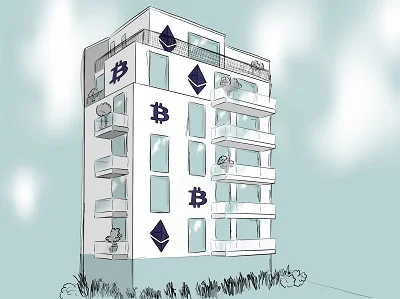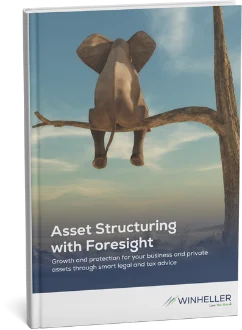Real Estate Acquisition With Crypto Assets in Germany
A popular form of investment is real estate, and there are plenty of reasons for crypto investors to purchase one or possibly several properties in Germany.
Complementing crypto assets with rented property
Property generates ongoing profits when rented out, providing the owner with current income. The owner can either use or reinvest the current income.
These three points (current income, use, reinvestment) are achieved without the owner having to sell their assets - the real estate.
This differs noticeably from most types of crypto investments, in which the return is derived from the increase in value and is only realized upon sale. Crypto assets must either be held for the long term and then sold definitively in a one-time sale or be traded regularly, i.e. sold and re-bought and thus rebalanced to generate returns through the sales profit.

Acquiring real estate with borrowed capital instead of crypto profits
Rented property can be purchased through banking investments with a large share of borrowed capital, i.e. loans. In this respect, a crypto investor also conserves their crypto holdings, as they only need to sell a smaller portion of their - often dearly held - crypto assets in order to diversify the investment portfolio and complement crypto assets with “concrete gold.”
Depending on
- the property,
- the experience of the investor, and
- key financial data,
banks often finance between 60-100 percent of the purchase price through loans (in individual cases even more, i.e. including additional purchase costs such as brokerage fees, land transfer tax, and notary and land registry fees).
Real estate protects against inflation
Crypto investors often view our monetary system of fiat currencies rather skeptically because of its relative infinite propagation. Real estate is also a suitable complement in this respect, as it is often considered to be effective protection against inflation since its tangible asset is less dependent on monetary depreciation, even if the "price" naturally fluctuates.
Real estate value in euros (or another fiat currency) frequently increases more than general monetary depreciation, even though there is, of course, no assurance of this for the future. Maintenance and other management costs should also be taken into account, but, if suitable property is selected, these should naturally be significantly lower priced than the current rental income.
Sale of the property tax-free after ten years
The advantage of a property investment in taxable private assets in Germany is that the rented property can be sold after ten years; the capital gain is then tax-free in most cases. The disadvantage is that the owner and renter must pay tax on the rental income on an ongoing basis at the private income tax rate. This is often assessed at 42 percent plus a solidarity surcharge, provided that the owner and renter achieve a specific taxable earned income.
If the crypto investor has suspended their current professional activity, the tax rate should be significantly lower.
If an investment-oriented real estate portfolio with several properties or a property with rental income of EUR 100,000 or more is planned, a legal form that reduces taxation to 15 percent or approx. 30 percent, in each case plus solidarity surcharge, may be advisable, thus enabling more extensive reinvestment.
Our consulting services for the acquisition of real estate with cryptocurrencies
- Our experts will gladly advise you in identifying the legal form and tax structure for your project that optimally complement your other investment activities.
- We will also gladly undertake the necessary review of the legal circumstances of the property:
- Leases,
- Sales tax status,
- Input tax adjustment periods,
- Possible declaration of division and community regulations,
- Public-law status of the property, such as legality under building law,
- and much more.
- Our experts will also gladly support you during the purchase process, as the notary cannot view the purchase project from your perspective alone and therefore cannot provide effective advice for your interests:
- Conditions of payment of the purchase price in your interest,
- Adjustment of the rules for a warranty for defects and supplement and for necessary and legitimate guarantees that the buyer should provide,
- Division of the purchase price into land value and building value, which is important for tax purposes,
- Regulations on sales tax status.
Your advisors for real estate acquisition with crypto assets in Germany
Are you a successful crypto investor looking to acquire real estate? Our experienced consultants will stand by your side.
The best way to reach us is via e-mail (info@winheller.com) and by phone (+49 69 76 75 77 85 22).
Do you need support?
Do you have questions about our services or would you like to arrange a personal consultation? We look forward to hearing from you! Please fill in the following information.
Or give us a call: +49 69 76 75 77 85 22





